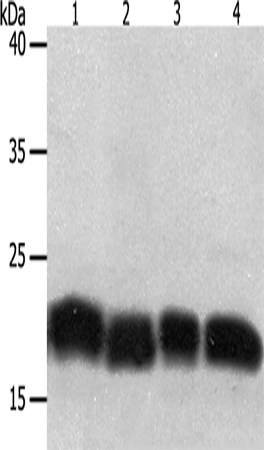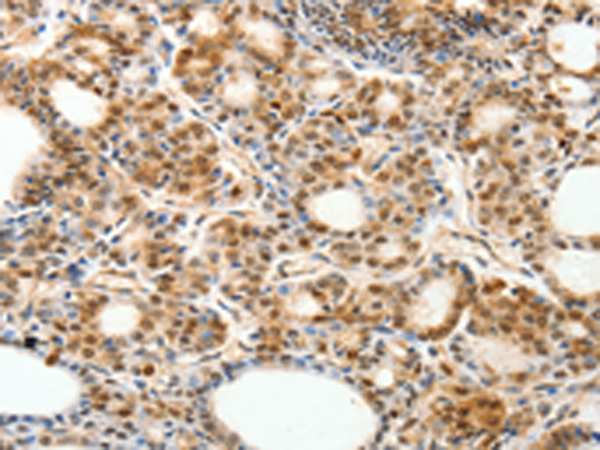

| WB | 1/200-1/1000 | Human,Mouse,Rat |
| IF | 咨询技术 | Human,Mouse,Rat |
| IHC | 1/25-1/100 | Human,Mouse,Rat |
| ICC | 技术咨询 | Human,Mouse,Rat |
| FCM | 咨询技术 | Human,Mouse,Rat |
| Elisa | 1/1000-1/5000 | Human,Mouse,Rat |
| Aliases | ALG-2, PEF1B |
| WB Predicted band size | 22 kDa |
| Host/Isotype | Rabbit IgG |
| Antibody Type | Primary antibody |
| Storage | Store at 4°C short term. Aliquot and store at -20°C long term. Avoid freeze/thaw cycles. |
| Species Reactivity | Human, Mouse |
| Immunogen | Fusion protein of human PDCD6 |
| Formulation | Purified antibody in PBS with 0.05% sodium azide and 50% glycerol. |
+ +
以下是关于PDCD6抗体的3篇示例参考文献(注:文献信息为模拟示例,建议通过PubMed或Google Scholar验证实际文献):
---
1. **文献名称**: "PDCD6/ALG-2 promotes cisplatin resistance in non-small cell lung cancer by modulating apoptosis and autophagy"
**作者**: Li X, et al.
**摘要**: 研究揭示了PDCD6通过抑制caspase依赖性凋亡通路并激活自噬途径,增强非小细胞肺癌对顺铂的耐药性,提示其作为潜在治疗靶点。
2. **文献名称**: "Development of a monoclonal antibody targeting PDCD6 for hepatocellular carcinoma diagnosis"
**作者**: Wang Y, et al.
**摘要**: 报道了一种高特异性抗PDCD6单克隆抗体的开发,该抗体在肝细胞癌组织中显示高敏感性,可作为早期诊断的生物标志物。
3. **文献名称**: "Structural insights into PDCD6-ALIX interaction and implications for exosome biogenesis"
**作者**: Suzuki H, et al.
**摘要**: 通过X射线晶体学解析PDCD6与ALIX蛋白的结合结构,阐明其在细胞外泌体形成中的分子机制,为靶向干预提供结构基础。
---
如需具体文献,建议通过关键词 **"PDCD6 antibody"** 或 **"PDCD6 function"** 在学术数据库中检索最新研究。
PDCD6 (Programmed Cell Death 6), also known as ALG-2 (Apoptosis-Linked Gene 2), is a calcium-binding protein involved in diverse cellular processes, including apoptosis, endoplasmic reticulum stress response, and membrane trafficking. It belongs to the penta-EF-hand protein family and interacts with partners like ALIX and Sec31A through calcium-dependent mechanisms. PDCD6 plays a dual role in apoptosis, acting as either a pro- or anti-apoptotic regulator depending on cellular context and interacting partners. Dysregulation of PDCD6 has been linked to cancers, neurodegenerative diseases, and immune disorders, making it a potential therapeutic or diagnostic target.
PDCD6 antibodies are immunological tools developed to detect and study the expression, localization, and function of PDCD6 in research and clinical settings. These antibodies are typically generated in hosts like rabbits or mice using immunogenic peptides or recombinant PDCD6 protein. They are validated for applications such as Western blotting, immunohistochemistry, immunofluorescence, and flow cytometry. High-quality PDCD6 antibodies help elucidate its role in disease mechanisms, particularly in apoptosis-related pathways and tumor progression. Recent studies also explore PDCD6's interaction networks using these antibodies, providing insights into its regulatory mechanisms in cellular stress responses. Commercial PDCD6 antibodies often undergo rigorous specificity testing, including knockout/knockdown validation, to ensure reliability in experimental models.
×